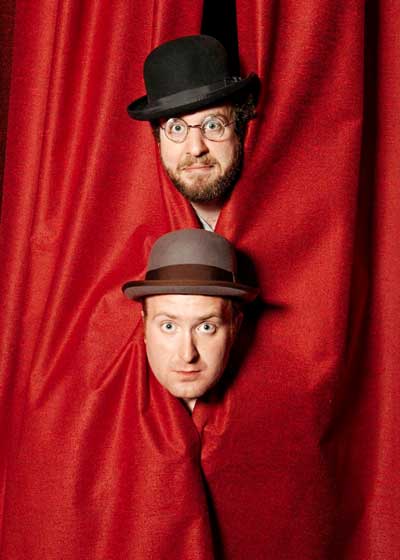Play (2013)
by Dave Hanson
Directed by Paula Plum
Hub Theatre Company of Boston
Club Cafe
209 Columubus Avenue, Boston
July 14-29, 2017
With Robert Orzalli (Ester, an understudy), Gabriel Graetz (Val, an understudy), Lauren Elias (Laura, the ASM)

Gabriel Graetz as Val
in “Waiting for Waiting for Godot”
Photo: Courtesy of Hub Theatre Company of Boston
A production of Waiting for Godot is going on offstage in the scene of the Waiting for Waiting for Godot action we are watching here. Set up a bit like Michael Frayn’s modern classic, Noises Off, in which we watch all of the crazy goings on behind the stage as a production occurs, WFWFG highlights the backstage action but with a little less frenzy and a bit more angst.
Here, not much is going on but the warped, weird but scintillating dialogue of the two understudies, Ester (Robert Brazilli) and Val (Gabriel Graetz), as they pass the time while waiting for and wishing that they have a chance to get onstage. Adding poignancy and a touch of unseen suspense, Val’s aged aunt has been sitting in the audience every night of the production waiting for the opportunity to see her nephew perform.
Meanwhile Val and Ester fester backstage exchanging barbs and banter. Laura (Lauren Elias), the assistant stage manager, shows up from time to time to remark on the goings on and to add a touch of piquancy to the main exchange going on between the two understudies.
Unexpected and out of kilter for the highmindedness of the Beckett production, both understudies enter with Broadway show tunes which embellish the scenes throughout, adding sweet and tuneful melodies from The Man of LaMancha, Annie Get Your Gun and Gypsy. It’s a cute footnote to the knowledge and presumption that Samuel Beckett is being performed on the unseen stage, a reminder that in the end, literary or not, this is all show business.
A coffee cup brought in by Val from Cumberland Farms gives rise to a discussion led by Ester about the pursuit of free coffee via the distribution of signed head shots, more acknowledgement of the behind the scenes aspect to theatrical life. (The mention of Cumberland Farms, by the way, is only one of the Boston references, with other shouts out to the Boston Common and The Pine Street Inn.)
Multiple gags – including many sight gags – are sewn together to make a charmingly humorous pastiche.
In this show beside the show, the understudies are not waiting for Godot himself, such as he is, but for the director of Waiting for Godot who assumes an analogous role. Ever unseen, the big question is whether he will ever show up to tell them that they will appear onstage – a very funny, down to earth, take off on the high minded and esoteric theme of the Beckett play.
To add insult to existential unknowingness, the understudies don’t seem to know their lines, enabling another great gag in which they hysterically mumble and garble their presumed the lines with which they have little or no familiarity. An extremely long exchange, painfully but effectively attenuated, involves the two actors shouting a repeated line back and forth to one another.
Ester can’t seem to fit into his vest, spending a lot of time trying to squeeze into it, and it turns out that he’s lifted it from the actual onstage actor. Crossing himself at every turn to validate some point or other, Ester finally declares that he’s Jewish, another in a line of endless absurdities that give this fun takeoff irnoic dimension as it rolls along.
Much inside talk about theatrical agents ensues and a consideration of where one has studied acting (“No one actually goes to Juilliard!”) while both actors acknowledge they have no idea who Godot is or what it signifies. None of that prevents them having an earnest desire to get onstage.
Paula Plum’s direction is effective in managing a script which hovers somewhere between an ironic takeoff on Beckett’s heavier existential drama and a clever vaudeville of comic routines lined up next to one another. She enables the production to offer a wink in the direction of substance while managing to keep it light and fun in the process.
Robert Brazilli embodies a dignified silliness that prevails throughout, giving his role more the elevated satire of Beckett’s Vladimir, while Gabriel Graetz follows along adding a softer and more sentimental complement, calling to mind the more hampered and forlorn Estragon.
The relaxed dinner venue at Club Cafe offers the opportunity to indulge in victuals and drinks while taking in the comedy. The show runs a bit under an hour and a half, so one wouldn’t starve without doing so, but it’s a nice added touch in an atypical dramatic venue.
– BADMan
Leave a Reply